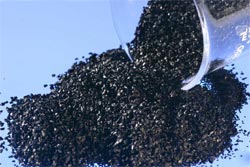New coconut shell, catalytic carbon water treatment product extends carbon life and reduces overall life cycle costs

Siemens introduces AquaCarb 1240CAT catalytic carbon based on coconut shell to the North American market. Picture: Siemens AG<br>
It uses coconut shell-based carbon specially processed to offer enhanced performance capabilities over traditional catalytic carbons in water treatment. The new product can provide improved results in water quality targets for chloramine, hydrogen sulfide (H2S), and hydrogen peroxide (H2O2) removal.
The coconut shell base provides a higher adsorption capacity with extensive micropore structure for VOCs (volatile organic compounds), lower ash content and higher hardness/abrasion resistance, which results in longer effective carbon life, reduced replacement frequency and lower overall life cycle costs as compared to traditional catalytic coal carbons in the market.
Applications for this new product include H2O2 removal in semiconductor wastewater or groundwater remediation systems employing UV oxidation, H2S and chloramine removal for the treatment of municipal drinking water, and chloramine reduction for process water treatment in the bottling industry. Previously, these applications were addressed with catalytic activated carbons based on bituminous coal.
“This product provides an alternative choice for catalytic activated carbon, and offers improved performance in many applications as we’ve seen with our other coconut shell-based carbons,” commented Christopher Rinaldi, General Manager of Siemens’ activated carbon business. “In addition, coconut, as a renewable resource, is gentler to the environment than coal-based carbon products.”
Siemens Water Technologies is a leader in carbon adsorption technology through the Westates line of activated carbons and equipment. As well, Siemens offers a wide range of technical and field support services including analytical testing, removal and installation and spent carbon reactivation and recycling, all of which help ensure that adsorber systems continue to operate efficiently and downtime is minimized.
AquaCarb and Westates are trademarks of Siemens and its affiliates in some countries.
Further information about AquaCarb 1240CAT and other solutions for water treatment is available at:
http://www.water.siemens.com/en/products/activated_carbon/granular_activated
_carbon_gac/Pages/aquacarb1240catcarbon.aspx and http://www.siemens.com/water
Contact USA
Karole Colangelo
Corporate Public Relations Manager
Siemens Water Technologies Corp.
Warrendale, PA, USA
847-713-8458 phone
E-mail address karole.colangelo@siemens.com
The Siemens Industry Sector (Erlangen, Germany) is the worldwide leading supplier of environmentally friendly production, transportation, building and lighting technologies. With integrated automation technologies and comprehensive industry-specific solutions, Siemens increases the productivity, efficiency and flexibility of its customers in the fields of industry and infrastructure. The Sector consists of six divisions: Building Technologies, Drive Technologies, Industry Automation, Industry Solutions, Mobility and Osram. With around 204,000 employees worldwide (September 30), Siemens Industry achieved in fiscal year 2010 total sales of approximately €34.9 billion. www.siemens.com/industry
The Siemens Industry Solutions Division (Erlangen, Germany) is one of the world's leading solution and service providers for industrial and infrastructure facilities comprising the business activities of Siemens VAI Metals Technologies, Water Technologies and Industrial Technologies. Activities include engineering and installation, operation and service for the entire life cycle. A wide-ranging portfolio of environmental solutions helps industrial companies to use energy, water and equipment efficiently, reduce emissions and comply with environmental guidelines. With around 29,000 employees worldwide (September 30), Siemens Industry Solutions posted sales of €6.0 billion in fiscal year 2010. http://www.siemens.com/industry-solutions
Media Contact
More Information:
http://www.siemens.com/waterAll latest news from the category: Process Engineering
This special field revolves around processes for modifying material properties (milling, cooling), composition (filtration, distillation) and type (oxidation, hydration).
Valuable information is available on a broad range of technologies including material separation, laser processes, measuring techniques and robot engineering in addition to testing methods and coating and materials analysis processes.
Newest articles

Self-Destructing Cancer Cells: Cutting-Edge RNA Breakthrough
Jülich scientists use novel RNA technology to selectively switch off tumours in the brain. An Adaptable Platform Technology That Destroys Glioblastoma Cancer Cells Using a special RNA molecule, a team…

Endurance Training: Transforming Lives of Heart Failure Patients
Can strength and endurance training be beneficial for patients with a certain form of heart failure? A research team from Greifswald investigated this question together with seven other research centers…

A Wake-Up Call for Mediterranean Shark Protection Against Extinction
Overfishing, illegal fishing and increasing marketing of shark meat pose significant threats to the more than 80 species of sharks and rays that inhabit the Mediterranean Sea, according to a…



